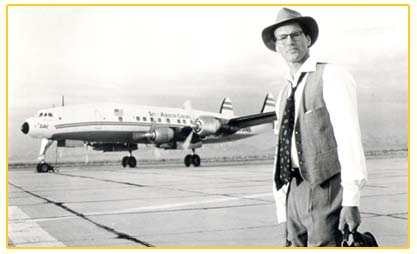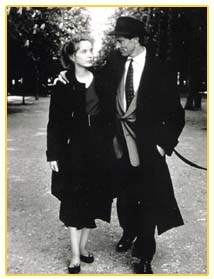|
The first few minutes of VOYAGER is
revealing of everything that is to
come. It opens black-and-white, outside a generic
50-ish airport populated by
generic 50-ish people and automobiles. The voyager shows
up, hugs this handsome woman
farewell, sits down in the utterly familiar waiting
room, and buries his head in
his hands in a sea of felt hats and cigarette smoke,
thinking of a certain woman
who no longer exists. He does not want to be there or
anywhere.
"What
was the use of looking anymore? There was nothing
for me to see. Her hands
that no longer existed anywhere, her movements as
she tossed the pony-tail
toward the back of her head, her teeth, her lips,
her eyes that no longer
existed anywhere -- where could I look for them?"

Then color filters back on screen as
the camera takes him two months back in
time, to another waiting room straight out of
faded photographs, poised to miss
another plane. Over and over again the film would
echo this strong sense of
spatial dislocation, address the circular nature of
time, narrate the story as
some sort of a chronicle of a death foretold and of
human endeavors foredoomed,
and enhance it with flashbacks and voice-overs by
someone precisely situated in
a certain period in history and thus make the events
twice removed from us, and do
all of these with plenty of sardonic humor and
self-irony. It is a good,
solid beginning for a much overlooked, excellent
film.
Sam Shepard plays the voyager, Walter Faber, a
globe-trotting American engineer
who sets his bearings by his faith in technology
and treats metaphysics as an
exercise in the laws of probability. He carries with him
a bored, presumptuous air
which of course makes him irresistible to women. We
watch him snatched and
shepherded aboard a gorgeous propeller plane, turn into
an entry in plane-crash
statistics, survive the landing, and become
witness to a suicide in a strange land - all
appropriately meaningless and
absurd, except that they call to him memories of a woman
he once knew before the war,
Hanna, whom he sees in crisp flashbacks. He returns to
civilization, haunted by
memories.
The "train of coincidence" runs on; he hops on a boat to
France to escape a female acquaintance and to
resume his anonymous, moment-to-moment existence atop
the bell-shaped curve. Instead, he runs into a young
woman he names "Sabeth" who reminds him of
his lost love. She is something of a paradox,
this Sabeth, terribly young and
vulnerable, a lover of ancient art and its
timeless mysteries, and at the same
time devoted to Camus and Sartre, those
unabashedly contemporary writers who
write of freedom and transparency and of
experiences created ex-nihilo,
unencumbered by a troublesome past. He sees her a lot,
and there are some delicate
scenes of glances exchanged in crowded ballrooms and
slow-dancing on the moonlit
deck. (The soundtrack is moody but very pretty.)
Stranded on an oceanliner in
the middle of the Atlantic, the voyager who shuns
entanglements finds himself
locked on to this young woman, a beckon that arose from
the depths of his past and
destined to guide him to complete an act of destruction
he set into motion some twenty years ago.

They land in Paris where Faber delivers speeches on the
Future of Mankind and stalks
Sabeth in art museums. They encounter the inevitable
scuffles in Parisian cafes and
graffiti protesting the Algerian war. The heart of the
film consists of the couple's
journey across the continent, from metropolitan Paris,
through blazing wheat-fields in the south of
France, to nameless historic Roman
ruins in Florence and Rome, finally to arrive at
the ancient villages of
Greece. Along the way are scattered sequences of great
tenderness and discipline
graced with extremely evocative camera work.
In Athens they are touched by tragedy and reunite with
Hanna; swiftly unfolding
events bridge the twenty years that separates them, and
simultaneously the memories that has been
tormenting Faber passes into the
present. The acting is particularly impressive in
this more somber half of the
film: e.g,. Delpy's Sabeth sitting dry-eyed and crushed
in the cafe where Faber left
her; Shepard and Barbara Sukowa's Hanna maneuvering to
wait each other out over
dinner; it is all quite extraordinarily restrained and
dignified.
There is something about the adaptation (or maybe it is
the cinematography) that makes
the tale's symbolic dimension leap off the screen and
highlights the cyclic quality
of this improbable tale of strong-willed, self-centered
people forging their fate only
to get ensnared by it. Yet the characters never come
across as mere mechanical parts reenacting an
ancient drama, nor do Faber's
relations with Sabeth or Hanna seem at any time less
than genuine.
|